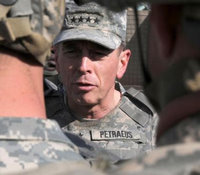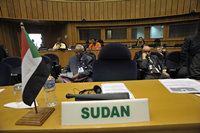I’d like to call your attention to WPR’s latest feature issue, The Age of Counterinsurgency, which just went live today. Regular readers of the blog know that I’ve got a particular interest in this subject. I think today’s feature issue should give you an idea why. Counterinsurgency doctrine, or COIN, represents the first rough draft of the dominant strategic vision that has emerged from the post-9/11 era: that failed and failing states represent the principal national security threat to the U.S. because of the safe haven they might provide to transnational terrorist networks, and that only a full-spectrum, whole-of-government approach […]
Iraq Archive
Free Newsletter

Internecine ideological battles have bedeviled the foreign policy of every U.S. administration in recent memory. Human rights liberals fought unsuccessfully with Cold Warriors for control of the Carter administration. New-right hardliners initially won the war for Ronald Reagan’s foreign policy soul but then lost it to George Schultz’s old-guard Republican realists. The Clinton administration became an altar on which liberal interventionists exorcised the Democratic Party’s Vietnam Syndrome demons. Most bitterly and most tragically, the first term of George W. Bush’s presidency demonstrated what happens when neoconservatives and their allies win more ideological contests than they lose. Barack Obama’s young presidency […]
Two more COIN-as-domestic-policing stories of note: The Naval Postgraduate School will be advising Salinas in that city’s anti-gang campaign (via Andrew Exum); and thanks to a combination of tough policing and community organizing, Compton is no longer the Capital CPT (via Matthew Yglesias). The former reinforces my suspicions that the military approach to counterinsurgency will find a sympathetic domestic law enforcement audience. The latter tempers the perceived threat by illustrating the ways in which the “smart power” approach to gangs and organized crime had already been formulated and applied before our current wars of counterinsurgency. In fact, back in 1997, […]
Jason Sigger passes along a very timely post from Sven Ortmann questioning the emerging “hybrid warfare” groupthink meme. Ortmann provides historical examples that illustrate how warfare has always involved both regular and irregular aspects. I’d add that victory is always asymmetric, since it involves bypassing the strength of the enemy, and that military innovation has always been the result of finding responses to superior capacities or resources. Cavalry was initially an asymmetric response to the superiority of massed infantry; artillery evolved out of the need to reduce the advantage inherent to defending fortresses. If there’s a difference, it’s that today’s […]
A few weeks back, I argued that the U.S. military’s emphasis on stability operations might not lead to increased counterinsurgency wars of choice, but speculated about ways in which it would almost certainly impact policymakers’ strategic vision. Here is the first item on that list: 1) An emphasis onstability as the strategic objective of American foreign policy. Thisis largely consistent with America’s historical emphasis, primarily dueto the benefits of stability to trade and commerce. But with failedstates now being perceived as a national security threat vector, thatwill probably increase. The downside is that promoting stability, ifpushed to an extreme, can […]
Earlier this month, I dashed off two posts (here and here) about the risk of counterinsurgency tactics used in Iraq making their way into domestic law enforcement. As I wrote at the time: Without goingoverboard or adopting a paranoid posture, I fear the integration ofcivilian policing with counterinsurgency campaigns will have a levelingeffect on both. That’s better for counterinsurgency campaigns than itis for civilian policing. Here’s Andrew Exum over at Abu Muqawama today: I just read in the newspaper that a fourth Oakland police officerhas died after being taken off of life support. A reader fromCalifornia wrote in a few […]
In many ways, Stephen Metz’s recent Small Wars Journal post is an echo of the ongoing debate over whether the ascendancy of counterinsurgency doctrine in the U.S. military will lead to a strategic shift towards more counterinsurgency wars of choice. COIN practitioners have argued that the enormous costs and complexities of counterinsurgency combined with the limited chances of success argue against widespread use. Their mantra is, Don’t confuse tactics with strategy. Metz, though, gives anecdotal evidence to the effect that the COIN focus on stabilizing states has already crept into the strategic assumptions of military futurists. He questions counterinsurgency not […]
This is just a re-occuring, random thought that’s been bouncing around in my head for the past few weeks, but I thought I’d air it out: Is there something peculiar to the Iraq and Afghanistan Wars that explains why the literature to emerge from them is almost exclusively non-fiction, whether war memoirs or war reporting? Or does that just reflect on the current state of the publishing industry? My hunch is that it’s both. Or to be more specific, it’s a reflection of the professionalization of the military. To be sure, there were plenty of war memoirs to come out […]
Last week I mentioned that COIN offers a vision of war that is more intellectually satisfying and morally palatable. Today over at Small Wars Journal (.pdf), Jason Fritz takes that a step further and calls it more aethsetically pleasing — to its proponents. It’s an interesting framing of the COIN vs. Conventional debate, where the zealots on either extreme of the spectrum are actually blinded by the beauty of their ideal method of warfare. Here’s Fritz: . . . Multi-agency counterinsurgency doctrine provides a holistic governmentsolution for socio-political-economic problems. It is government at itsbest — various agencies working together to […]
If you’ve been following the “COIN will breed COIN” debate, check out these posts by Andrew Exum, Matthew Yglesias and Spencer Ackerman. If you haven’t, check them out anyway. It’s an interesting discussion of whether in makingCOIN a doctrinal focus of operations, the U.S. military will be tempted to intervene in counterinsurgencies of choice. It’s a subject I’ve written about often over the past 18 months. If anything has reassured me that my worries weren’t warranted, it’s been Secretary of Defense Bob Gates’ emphasis on “strategic balance.” Exum’s insistence that COIN practitioners are not necessarily COIN enthusiasts rings true, too. […]
Yesterday I dashed off a post expressing concern that COIN’s low-intensity, population-centric tactics might eventually make their way into domestic policing via returning vets. Today at Small Wars Journal, Ben Fitzgerald and Scott Brady discuss the need for domestic policing to make its way into COIN’s low-intensity, population-centric tactics via deployed civilian law enforcement officers: From a military perspective, the value of law enforcement may be seenas enhancing the military’s conduct of population centric operationsthrough improved patrolling techniques, investigation, communityengagement, graduated use of force etc. Separate to the militaryperspective is the potential to deploy civilian law enforcementpersonnel to essentially perform […]

ADVOCATES CHEER AL-BASHIR WARRANT — Human rights groups from around the world cheered the issue of an arrest warrant for Sudanese President Omar Hassan al-Bashir by the Intenational Criminal Court to face charges of crimes against humanity. “The ICC represents the best hope for justice for the victims of Darfur,” Dismas Nkunda of the International Refugee Rights Initiative said in a statement released by the Justice for Darfur coalition. “The international community must ensure that Sudan complies with its obligation to cooperate with the ICC, including by handing over anyone subject to an arrest warrant.” Bashir has long been a […]
Setting aside the thorny question of legal sovereignty, here’s a thought that’s been percolating in my head over the past couple days: Does the lack of any local opposition, whether armed or otherwise, to the Russian military presence in Abkhazia and South Ossetia lend any legitimacy to the de facto disaggregation of the two breakawy provinces? Granted, Russian forces had already been there for over a decade as peacekeepers, and the “invasion” was not accompanied by regime change. But at a time when both American counterinsurgency doctrine and American diplomacy is increasingly engaging on the local level in Iraq and […]
Lt. Gen. Paul Van Riper (ret.) weighs in on a discussion of “hybrid war” over at Small Wars Journal with a good point. Maybe it’s time to get back to the basics and just start calling armed conflicts between enemies “war” again. That reminds me of something French Gen. Vincent Desportes said (.pdf) about “asymmetric war,” namely that all war is asymmetric, because victory depends on playing to your strengths while capitalizing on your enemy’s weaknesses. More important at this point is to get a consensus on a good working definition of peace. That’s what will ultimately determine when we […]
Recently Andrew Exum (a.k.a. Abu Muqawama) noted that Tom Ricks’ book, The Gamble, had neglected to examine the role of New Media in the Surge’s success. That led Dave Dilegge of Small Wars Journal to send out a call for comments. I was very flattered to be invited to contribute my thoughts, then humbled by the company: Dave Kilcullen, Janine Davidson, Tom Barnett, Exum, Spencer Ackerman, Michael Yon, and more. The entire document can be found here (.pdf), and Dave is also compiling an updated list of responses from around the web in this SWJ blog post. (Josh Foust’s comments […]
